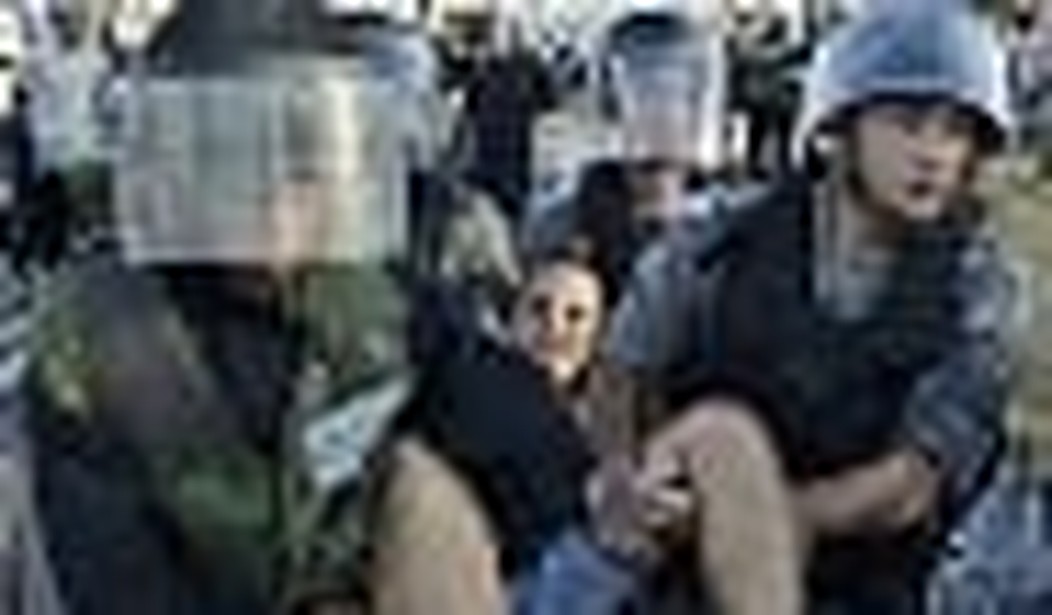On Israel’s Mediterranean coast, the usually sleepy port city of Acco has been hit by an ugly wake-up call: its Arab and Jewish residents currently need hundreds of police officers in riot gear to keep them from attacking one another.
Following the ongoing riots that first erupted hours after Yom Kippur, the holiest day of the Jewish year, Acco looks like a mini-war zone. The streets are littered with cars with their windows smashed in — some of them turned upside down. Police have been in full-force, physically dragging away demonstrators sometimes with the help of tear gas and water cannons, and blocking Jews from Arab neighborhoods and Arabs from Jewish ones as shopkeepers sweep the glass from their broken storefront windows.
“We are planning ahead for the scenario of, God forbid, violence spreading to other places. I call on leaders, both in the Jewish community and Arab community, to act sensibly,” said Avi Dichter, the Israeli public security minister. The two days of rioting began on Yom Kippur, when a hush falls over the country’s Jewish majority observing the holy day. Traffic across the country virtually comes to a complete halt on what is traditionally a day of fasting and reflection. There is no television or radio broadcasting and all stores in Jewish areas are closed.
Acco is a mixed Jewish and Arab city and on Wednesday, despite the holiday, Tawfik Jamal, an Arab resident of the city, drove through a Jewish neighborhood, reportedly at high speed.
Jewish youths in the area who said they saw the act as provocation swarmed him and his son when they emerged from his vehicle and hurled stones at them, forcing them to flee. The driver was protected by local police but word reportedly spread in the Arab community, incorrectly, that he had been killed.
Local mosques called for revenge on loudspeakers and soon after the streets filled with young Arab men chanting “Kill the Jews” which was returned the next day with Jewish residents shouting “Death to the Arabs,” residents said.
The first night of rioting, Silvi Vaknin, who is Jewish, took refuge in her family’s bomb shelter.
“There was a mob, carrying clubs and stones, shattering vehicles and causing destruction. They demolished my husband’s car, threw stones and entered the house’s balcony. We turned out the lights and got into the home shelter. It was very scary,” she told the daily Yediot Achronot.
The city, once a Crusader stronghold whose Old City is a popular tourist attraction of winding stone alleyways and tunnels that gives a hint of a grander past, is today a working-class town of some 46,000. Over 25 percent are Arabs and some locals say the veneer of coexistence in the city has always been shaky at best.
“Acco was never a model of coexistence.” Arab resident Zohir Bahalul, an Acco native and television sportscaster wrote in a newspaper column on Friday, “The Arab population in Acco is groaning below the poverty line. This is a poor and despised population. … Those who didn’t bother to invest in the people reaped repressed anger and enormous frustration.”
Other local Arabs tried to downplay the tensions, saying the rampage of vandalism and property destruction was an isolated event.
But Jews, especially lawmakers from the more hawkish political parties, were quick to describe it in historical terms with special resonance to Jewish ears. Some described it as a pogrom, others even termed it a new Kristallnacht, referring to the night in November 1938 where the Nazis in Austria and Germany launched a coordinated violent attack on Jewish businesses, homes, and synagogues. It’s a loaded term as it’s considered a launching point for the atrocities that would become the Holocaust. Police should “not be surprised when Jews take up arms to protect themselves” in turn, said Arieh Eldad, a lawmaker with the National Union party.
But touring the city Friday, Tzipi Livni, the foreign minister and the prime minister-designate, warned against just that. “The state of Israel will not be a place where people take the law into their own hands, even when they are very angry,” she said. On Friday the feeling permeating the city was one of fear and uncertainty. Some 60 percent of school children were kept home by their parents. Some families left the city for the weekend.
Police officials said they had a list of the Imams behind what they said was a campaign of incitement to go extract revenge and attack Jews.
The unrest strikes a sensitive chord in Israel where some 20 percent of the population is Arab. In recent years the community has been increasingly vocal in identifying with and supporting their Palestinian counterparts, adding to Israeli jitters that they belong to a fifth column. Historically the same Palestinian people living in Israel were those who stayed within the borders after the fighting for the country’s independence came to a close in 1949. Although legally equal in status and rights to Jews, many Israeli Arabs complain of discrimination in work and services.
Meanwhile the one thing that certainly unites everyone in the city — business — is another victim of the clashes. A fringe theater festival held annually in the city, bringing in thousands of people, was postponed indefinitely because of the unrest, out of fear that the police would not be able to protect visitors. Trying to sound a note of calm, an Arab resident of the city appeared in front of the TV cameras with a simple message, “We want peace.”









Join the conversation as a VIP Member